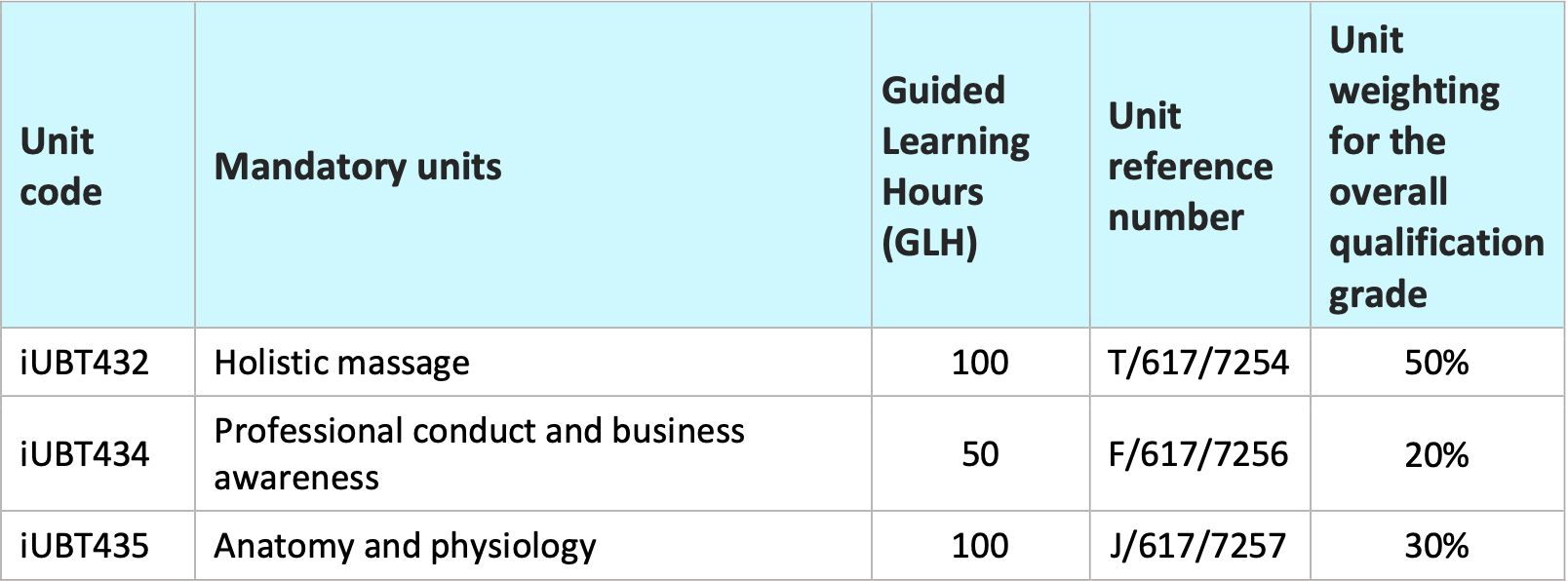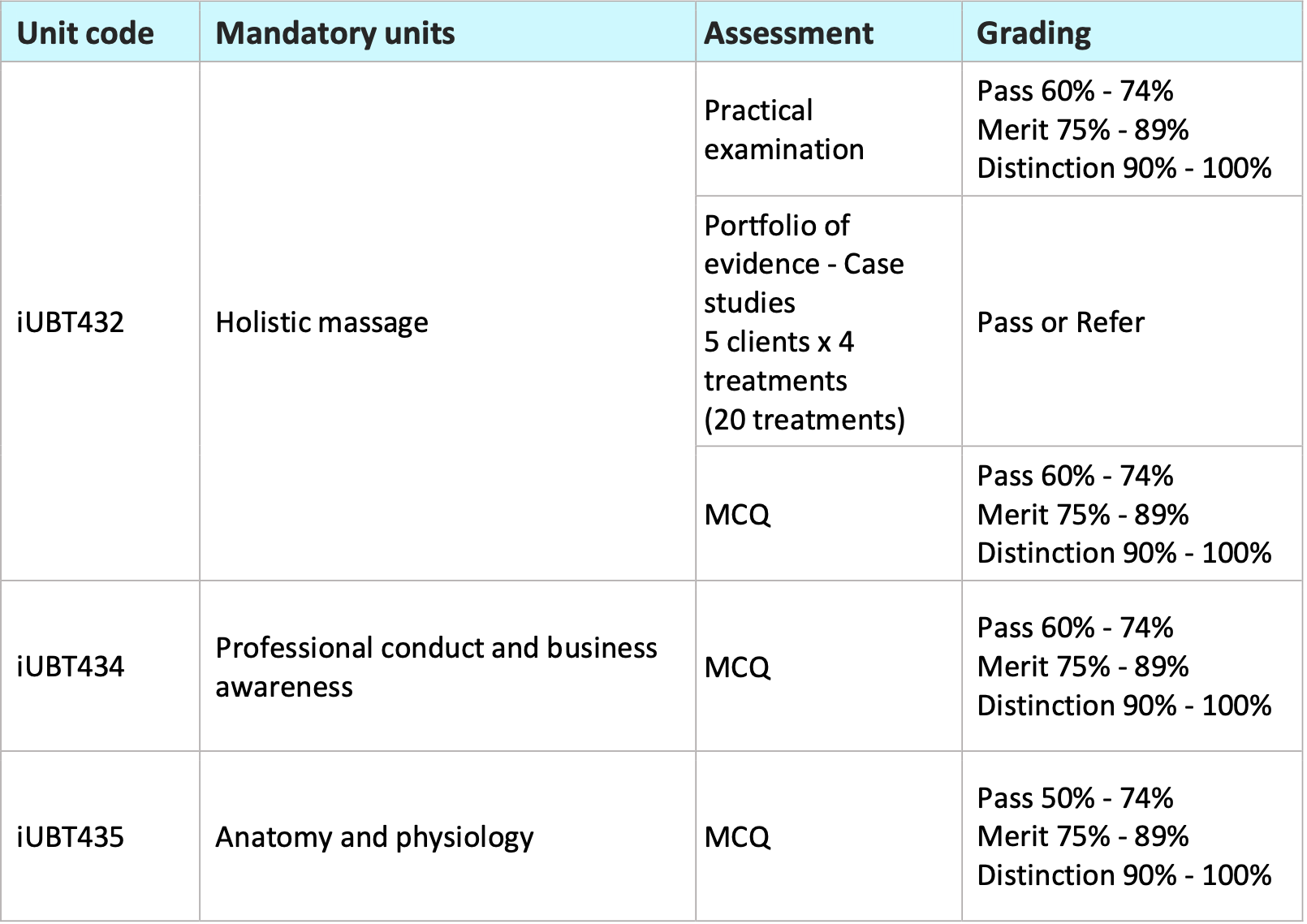Diploma in Holistic Massage
Courses
Level 3 (RQF) NQF IE Level 5
Cost: €900
1/2 day per week, for 16 weeks
Timetable: 13:00 - 16:00 Tuesday's, 18:00-21:00 Tuesday's
Aims and Objectives
The main aim of the VTCT (ITEC) Level 3 Diploma in Holistic Massage is to enable learners to gain the necessary practical and theoretical skills in order to provide massage treatments to the general public and to gain employment in the massage industry. (A&P is a pre-requisite)
This qualification is suitable for learners aged 16 and over and is designed to provide occupational competence at level 3. It also provides a sound platform into further training at level 3 and 4.
The main skills the learner will perform are: Consultation techniques – to include understanding the needs of clients and when and when not to treat them, contra-indications, referral procedures explaining possible contra-actions and providing aftercare and homecare advice Health, safety and hygiene – contextualised to the environment in which the learner is working Holistic massage techniques – to include selecting a suitable massage medium for the client’s skin type, classical massage movements and adapting the treatment to the client’s specific needs.
Content
This qualification is for learners who want to work within the massage industry. The qualification consists of 3 mandatory units with a total of 250 hours of Guided Learning (GL) to achieve the full qualification.
The main skills the learner will perform are:
- Consultation techniques–to include understanding the needs of clients and when and when not to treat them, contra-indications, referral procedures explaining possible contra-actions and providing aftercare and homecare advice
- Health, safety and hygiene–contextualised to the environment in which the learner is working
-
Holistic massage techniques–to include selecting a suitable massage medium for the client’s skin type, classical massage movements and adapting the treatment to the client’s specific needs
The learner will also develop knowledge about current legislation and working practice requirements and client care and communication which is essential to work and be successful in the industry.
This qualification also provides:
- The related knowledge and understanding required to perform the massage skills listed above effectively, in particular the anatomy and physiology of the body and common diseases and disorders that may affect when a client should or should not receive treatment
- Knowledge and understanding of the principles and practice of complementary therapies
- Knowledge and understanding of professional conduct and business awareness in a complementary therapies context
- Opportunities for learners to focus on the development of their wider skills in a massage setting such as communicating with clients, working with others and problem solving
- Opportunities for learners to develop a range of skills, techniques, personal qualities and attitudes essential for successful performance in employment as an holistic massage therapist
Opportunities for progression
Once learners have achieved the VTCT (ITEC) Level 3 Diploma in Holistic Massage they may progress on to other VTCT (ITEC) or equivalent qualifications at level 3 and 4, for example:
- Level 3 Diploma in Indian Head Massage
- Level 3 Diploma in Complementary Therapies
- Level 3 Diploma in Aromatherapy
- Level 3 Diploma in Reflexology
- Level 3 Diploma in Sports Massage
- Level 4 Diploma in Spa and Salon Management
Opportunities for employment
There are opportunities for holistic massage therapists to find employment in a variety of areas:
- Complementary health clinics
- Primary health trusts
- Beauty salons
- Spa
- Cruise ships
- Hotels or resorts
- Own clinic
Qualification Structure
To be awarded the VTCT (ITEC) Level 3 Diploma in Holistic Massage, learners must achieve all mandatory units.
The minimum GLH required to achieve this qualification is 250 The minimum TQT required to achieve this qualification is 410

Assessment
All internal assessments, treatment evidence, case studies and underpinning knowledge must be completed prior to the final practical examination.
The final external practical examination will be carried out by the external examiner at the end of the period of learning. The external examiner will also verify a sample of the internal assessment, treatment evidence and case studies.


